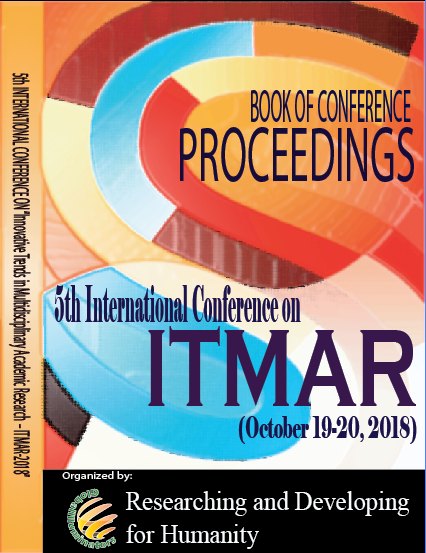
ITMAR Proceedings
ITMAR Proceeding
Volume 5, Pages 1-44
2018 ITMAR Conference on “INNOVATIVE TRENDS IN MULTIDISCIPLINARY ACADEMIC RESEARCH” (ITMAR 2018)
October 19-20, 2018 Istanbul Turkey
Edited by Dr. Ahmed Saddam
pp. 1-732 (2014)
2014 ITMAR Conference on “INNOVATIVE TRENDS IN MULTIDISCIPLINARY
ACADEMIC RESEARCH” (ITMAR 2014)
pp. 1-209 (2015)
2015 ITMAR Conference on “INNOVATIVE TRENDS IN MULTIDISCIPLINARY
ACADEMIC RESEARCH” (ITMAR 2015)
pp. 1-39 (2016)
2016 ITMAR Conference on “INNOVATIVE TRENDS IN MULTIDISCIPLINARY
ACADEMIC RESEARCH” (ITMAR 2016)
pp. 1-29 (2017)
2017 ITMAR Conference on “INNOVATIVE TRENDS IN MULTIDISCIPLINARY
ACADEMIC RESEARCH” (ITMAR 2017)
pp. 1-44 (2018)
2018 ITMAR Conference on “INNOVATIVE TRENDS IN MULTIDISCIPLINARY
ACADEMIC RESEARCH” (ITMAR 2017)
Track: Social Scinences And Humainites
Managing Acculturative Stress and Building an Effective Intercultural Relation: A Case Study among International Students at Universiti Malaysia Sabah
Pages 1-14
Halina Sendera Mohd. Yakin, Andreas Totu
Abstract
Migration is a centuries old issue and intercultural contact is an inevitable phenomenon that occurs globally and the rate increases annually in most countries in the world. Moving into and settling around a new cultural environment can be both exciting as well as challenging. Employing a qualitative method approach and Berry‘s Acculturation Theory as well as Kim‘s Cross-Cultural Adaptation Theory, this study investigates the intercultural experiences which focuses on acculturative stress experienced and coping strategies employed by the international students in an institution of higher learning in Sabah, Malaysia, namely Universiti Malaysia Sabah, particularly among the Chinese students from the People Republic of China (PRC). It is interesting to note that eventhough there are lots of problems and hurdles in managing the teaching and learning of the PRC students, the number of PRC students enrolment in the university continues to grow yearly and the figure is outnumbered compare to other international students. Normally, the sojourners will experience a certain degree of acculturative stress or culture shock at the early phase of migration especially among those who are adopting the separation and marginalization strategy of acculturation. Contrastingly, the findings reveal something different. Eventhough some of them have experienced a certain degree (minor) of acculturative stress, most of them were able to handle their migrating life as sojourners in Sabah quite comfortably. The results of this study contribute to the understanding of the obstacles and constraints faced by the sojourners as well as factors that lead to their succesfull adaptation. It offers positive implications and constructive recommendations towards building a conducive intercultural relation between the sojourners and the host.
The Muslim Subjects of the Kingdom of Georgia in the 12th-Eearly 13th Century
Pages 15-20
Gotcha Djaparidze, Nani Gelovani
Abstract
In the first of the 12th century, David IV the Builder, King of Georgia (1089-1125) completed the political unification of the country. Georgia, having thrown away the domination of Turk-Saljuq rule, turned into a powerful feudal monarchy. His seccessors Demetre I (1125-1156), Giorgi I (1156-11840), Tamar (1184-1210) and Giorgi Lasha (1210-1223) continued David the Builder‟s political course directed at uniting the Transcaucasian countries under Georgia‟s leadership. Georgia‟s expansion resulted not only in the redeeming of Georgian lands proper but also in incorporation of non-Georgian regions (part of Shirvan, North Armenia) together with their non-Georgian and non-Orthodox Christian Population: Muslims, Jews and Gregorians/Monophyte Armenians. This raised the problem of the status of the followers of other religions, especially of Muslims, who for the first time came under Georgian rule. The present study deals with the policy of tolerance of other religions pursued by Georgian King David IV the Builder and his successors in their Muslim subjects. It is suggested that the status of the Muslim population in the Christian Kingdom of Georgia resembled that of the dhimmis (or members of the “protected” communities) in the Islamic states, although the Muslims living in the Kingdom of Georgia enjoyed more rights than the dhimmis in Islamic countries, legally and socially they were not equal with Christians. The 12th-13th century Georgian literature and historical sources, expressing negative feelings towards Islam, keep silent about policy of Georgian kings towards their subjected Muslim population. But the works of Arab and Persian authors, dating from the same period, contain information concerning this fact. One part of these sources will be studied from the standpoint of the history of Georgia for the first time. The present study – based on primary sources in Georgian, Armenian, Arabic, and other languages, as well as the literature in the field – deals with the policy of tolerance of other religions pursued by Georgian King David IV the Builder and his successors in their Muslim subjects.
The Limitation Clauses on the Human Rights and Fundamental Freedoms and the Role of the Court of Justice of the European Union (CJEU)
Pages 21-29
Syed Raza Shah Gilani, Bushra Malik, Ali Fayyaz
Abstract
A society who believes in democracy may confined some individual rights in order to ensure the existence of the society and in the interest of public at large, e.g to guarantee the continual existence of the state, preserve its democratic nature, uphold public health and order, and provide public education, along with other national or collective objectives. The state is justified to limit these rights in order to achieve these goals. This brings about realization of the unique nature of the democratic political system whose bases are primarily on the trust between individual and society. Democracy is formed when there is a genuine connection among the welfare of the society and the benefit of the individual. The unified legal structure includes the society‟s interests and the human rights that determines the scope of human rights and allows for their limitation. These enquiries still need to be resolved that when is the state justified to restrict human rights and what is the genuine connection that should develop between the society‟s interest and human rights. No universally recognized response to this enquiry exists. Instead, there is a different answer to this question in every society and it fluctuates every now and then. This situation is described by every society according to its own situation that is created by its distinctive problems, historical events and the way it perceives itself. As a result, when the Holocaust and the atrocities of Nazis came into action during the post-World War II dignity was considered as the most important element of German democracy; generally human life, equivalence and self-respect are the central standards followed by post South-Africans. In order to achieve its morals as a democratic state, UK battles for a true connection between public necessities and individual rights. Even though human rights are considered to be a dominant attribute in all democracies, but the degree of their centrality varies from one democracy to another. As a result, democratic societies disagree on the proper relationship between human rights‟ and society‟s interests and here is where the concept of proportionality comes into play.
The Capacity Approach in Analysing the Local Actors Profiles in their Organization around the Tourism Project in the Province of Guelmim
Pages 30-34
Malika Ait Nasser
Abstract
The capability approach in the freedom of choice aspect and actors organization give rise to individual and collective competences according to their will and the particularity of their territory. The study of the profiles of the actors in their organization around the tourist projects is a reading of the territory and the stakes of its construction. So, what is the relationship between the capability of local actors and their profiles in the construction of tourism projects? The creation of a collective dynamic around the projects remains indicative of all the interests and influences on the behavior and the dynamics of the local actors that we wish to highlight through this article. The qualitative study of the actor in his organization around a tourism project allows, therefore, to make a reversal of the relationship between the divergent actors and the diversity of interests around the tourist project, which is not only considered in terms of externalities (whether positive or negative), but also as a key factor for the implementation of local development projects in the province of Guelmim’s territory.
Track: Engineering andTechnology studies
Application of Dynamic Frequency-Pulse Automatic Control Systems the Optical Fiber Exhaust
Pages 35-44
Tergeussizova Aliya Sovetjanovna, Aitchanov Bekmurza Husainovich, Toigozhinova Aynur Zhumakhanovna
Abstract
The article deals with the process of drawing the optical fiber as an object of automatic control. The control object is the zone of the optical fiber constriction, at the output of the object a fiber of a given diameter is obtained. The fiber diameter is controlled by changing hood speed and furnace temperature of the sample melt. The control system of the constriction zone is constructed taking into account the trend of the sample diameter. The structure of the automated tower and the structural control scheme of the optical fiber extraction are given. Another important task is to increase the dynamic accuracy of regulation. Low dynamic accuracy of regulation is due to the inertia of the regulated object and the so-called “transport delay”. The latter is determined by the time of the extracted glassware passage from the formation zone to the sensor determining the dimensions of the cross section. As a result, self-oscillations may appear. To solve the problem of temperature control, the most promising is the use of dynamic frequency-pulse systems for automatic control of objects with delay. Control systems of this class are characterized by the presence of nonlinear transformations of signals, as well as the parametric feedbacks. The article gives information on Mathematical description of object’s frequency-impulse control systems with delay.
